| |
|
|
|
|
|
|
|
|
|
|
| |
| |
 |
|
| |
田润德
编译文/图 2020-05\7-31
20:36 |
|
| |
|
|
|
|
| |
 |
|
|
|
| |
弗朗茨·李斯特(Franz Liszt,1811 —1886) |
|
|
|
| |
|
|
|
|
| |
瓦伦蒂娜·利西塔 演奏李斯特《死之舞》
|
|
|
|
| |
Valentina Lissita: Liszt's
Dance of the Dead |
|
|
|
| |
这首作品几乎是李斯特的钢琴技巧的一个总结和缩影,你能想象到的一切技巧,几乎都出现在这首曲子里面。尤其到了后段,各种高深的技巧让人瞠目结舌。比如450小节的华彩部分最远相距达13度的八度大跳(可以上钢琴上试试这是什么感觉),594小节双手连续横跨10度的琶音(手小的人还是不要轻易尝试吧),595小节李斯特特有的“用最短的时间横扫整个键盘”的超技技术,605小节双手反向八度大跳(据说除了齐默尔曼,其他钢琴家弹到此 |
|
|
|
| |
This piece is almost a
summary and epitome of Liszt's piano skills. Almost every skill you can
imagine is found in this piece.Especially in the latter part, the depth
of the technique is jaw-dropping.Such as 450 section of part farthest
octave big jump up to 13 degrees apart (can try on the piano on what is
this feeling), section 594 hands across 10 consecutive arpeggio (hand
small people still don't easily to try), section 595 liszt peculiar
"swept the keyboard with the shortest time" super skill of technology,
605 hands reverse octave section big jump (it is said that in addition
to zimmermann, other pianists playing here |
|
|
|
| |
|
|
|
|
| |
音乐历史上的今天
1886年7月31日,74岁的李斯特在拜鲁伊特去世。“瓦格纳家族没有流露公开悼念的迹象。女儿们(他的外孙女们)穿上黑裙,仅此而已......汪弗里德庄园的社交活动也没有因此中断。一切都像是被刻意安排成那样——弗朗茨.李斯特去世无足轻重,哪怕暂时的悼念也不应减弱音乐节的光芒。”(菲利克斯.魏因加特纳的《回忆录》)
《有史以来最伟大的钢琴家李斯特》
李斯特不仅是一位钢琴演奏大师,他还创作了许多令人百听不厌的乐曲,并且从不放过任何机会培育和扶持音乐界的后起之秀。
李斯特在其最负盛名时曾为友人瓦格纳演奏了他的几首圣乐,后者当时只是说道,“您的上帝何其喧闹!"如果能正确领会这句评语的话,可使我们对李斯特有吏好的了解。这位伟大的钢琴家和作曲家的确喜欢运用节奏强烈、激动人心的音响效果,使听众闻后热烈鼓掌。他的这些“喧闹的乐曲”确实是奉献给他的上帝的——因.为他为人热情友善,慷慨大度,而且笃信宗教,最后终于出家当了修士。
李斯特早年就非常虔诚。他经多方寻求,直到中年以后才找到真正可以皈依的教派。而同时他又过着极为世俗的生活。但是在1861年他五十四岁时,他成了天主教圣芳济会的教士并获得了神父的称号,从此终其余生。他在罗马过了二十四年的僧侣生活,虽然他一生中大部分时间是在德国和匈牙利度过的。
有人曾为他作了一张生动的画像,在画中这位庄严的老人高举明烛,亲自送客出门,柔和的烛光在他那满头银丝和慈祥的面貌周围形成了圣洁的光环,照亮了他的黑色法衣。教皇庇护九世把李斯特称作他的帕勒斯特里纳,对他极为宠爱.
1811年李斯特出生于匈牙利的莱丁,生来体弱多病。出世刚数月时,有一天晚上父亲回家发现母亲正在为这个婴儿的不幸无折而抽泣。村中的木匠已被召来为婴儿量尺寸制作棺材。但那口棺材始终没有用过,因为婴儿死而复苏。后来当李斯特成为举世闻名的大音乐家时,他用音乐真诚地感谢上帝使他获得再生。
李斯特和许多别的艺术家不同,他不必为生计和贫穷作斗争。他的父亲是埃斯特海齐伯爵家中的帐房先生,自身对音乐就有很深的造诣,是孩子的启蒙老师。李斯特九岁时即公开演出,这次演奏给大音乐家贝多芬留下了深刻的印象,他当场亲吻了这个小男孩。此后一些匈牙利贵族出钱资助他去维也纳学习了六年音乐。在那里他拜东尔尼为师,东尔尼的有关指法练习的书籍迄今仍然是年轻钢琴家们每日得花费数小时苦练基本功的必修课本。他也师事沙利艾里,贝多芬和舒柏特曾先后出自沙利艾里的门下。小小的李斯特在维也纳和各地到处举行音乐会,每场演出均赢得了热烈的掌声,他那优雅的举止和非凡的演奏风格使听众们为之倾倒。因而有人说“他是从太太小姐们的膝盖上登上成功之路的。”
1828年他父亲去世时他年仅十七岁,然而已名闻遐迩,完全能抚养他的母亲了。他的天赋和音乐魅力使他获得了“继世上七大奇迹以后的又一伟大奇迹”的美名。
李斯特在二十岁那年第一次听到了帕格尼尼的演奏,这位伟大的意大利小提琴家由于演技非同凡响,惊人出众,被认为具有神奇的魔法。从某种意义上来讲,这可以说是李斯特全部音乐生涯中的转折点。他下定决心要使自己的钢琴演奏得象帕格尼尼的小提琴那样出神入化。他勤学苦练,在指法上狠下功夫,务使自己能达到前无古人的地步。直到今日,他仍被认为是有史以来最伟大的钢琴家,这点足以说明他在这方面取得了何等辉煌的成就。同年他遇见了伟大的钢琴家和作曲家肖邦,从后者身上他又受到了启发,在演技和创作上获得了新的灵感。此后十五年问,他无论去何处演出,都博得了最热烈的掌声。一次他去维也纳演出,被奥地利皇帝晋封为爵士。
助人为乐的李斯特
这时,许多知名人士和很多伟大的音乐家如肖邦、舒曼、柏辽兹、鲁宾斯坦和瓦格纳等都成了他的挚友,对于他们的友谊,他完全可以受之无愧!因为对于同行,他总是慷慨大度,竭尽所能地帮助他们。1847年以后他的每一场演出都是尽义务的,自己分文不取。他家的大门总是为有音乐天赋的学生敞开的,他听他们的演奏,并对他们进行指导而不图任何报酬。当为贝多芬在波恩筹建塑像进行募捐所得之款项远远不敷所需时,李斯特慷慨解囊玉成其事。他在家乡莱丁为穷人设立了一笔永久性的福利基金;诸如此类的善举真是不胜枚举。
欧洲音乐界的权威
1848年他担任了魏玛公国的宫廷音乐指导,不再公开演出。他在那儿几乎成了全欧洲音乐界的权威,他给予所有年轻的新作曲家演奏其作品的机会,否则这些人得经过长期的等待才能使人昕到他们的作品。很多人为此对他怀恨在心,很多人不喜欢新音乐。但是后来证明,他这样做是正确的。曾经给予瓦格纳、柏辽兹和舒曼——这里仅举其中少数几位——热情帮助的人肯定应受到世人的感激。他的女儿科西玛以后嫁给了瓦格纳。就在1886年他去看望女儿,并参加在德国拜罗伊特举行的盛大的瓦格纳音乐节时他去世了。
虽然李斯特在作曲方面较之当时另一些大音乐家稍有逊色,但他仍为我们留下了许多美丽动听的乐曲。他把在自己祖国匈牙利流传的吉卜赛民间小调改编成优美和激动人心的钢琴曲,并称之谓“狂想曲”。这些乐曲是专门为他自己高超的演技而创作的,因此只有造诣较深的钢琴家敢于染指。他又为交响乐团创作了一种叫做交响诗的音乐,用音乐的形式来叙述文学作品。这些音乐诗篇如《俄耳甫斯》和《塔索》,充满了火一般的激情,表达了许多不同的情感。它们给交响音乐增添了一种新的形式,一种许多后来者乐于采用的形式。
(译自美国《分题百科全书》第12卷)
今日视频:1、瓦伦蒂娜·利西塔 演奏李斯特《死之舞》;2、电影《李斯特》中里赫特扮演的李斯特演奏格林卡《鲁斯兰和柳德米拉》。 |
|
|
|
| |
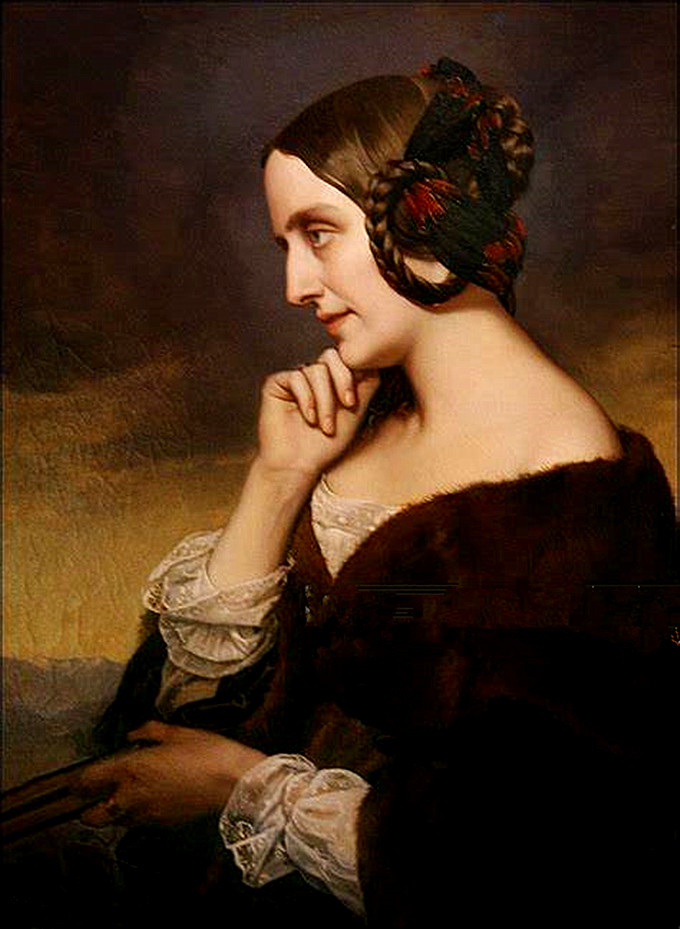 |
|
| |
李斯特的情人玛丽·德阿古特伯爵夫人 |
|
|
|
| |
1835年4月8日,“当结尾的乐声响起,我看见李斯特的脸上露出了一种混合着欢愉笑容的痛苦表情,我从来没有在其它任何人脸上看过类似的表情,除了我们的救世主画像.....他的手指在琴键上飞翔,我座位下的地面像丝网般震动,当李斯特的手和身体停止时,观众们仍然被余音所包围;他昏过去了......”——李斯特巴黎演奏会 |
|
|
|
| |
April 8,
1835: "as the closing music began, I saw liszt's face take on a painful
expression, mingled with a cheerful smile, which I had never seen on any
other face, save that of our saviour...His fingers flew over the keys,
the ground under my seat shook like a wire mesh, and when liszt's hands
and body stopped, the audience was still surrounded by the sound;He's
unconscious..."-- liszt's Paris concert |
|
|
|
| |
 |
|
|
|
| |
弗朗茨·李斯特(Franz Liszt) |
|
|
|
| |
李斯特遗嘱(1860年9月14日阿尔滕堡) |
|
|
|
| |
这是我的遗嘱。
写于1860年9月14日,即教会庆祝圣十字架赞美节的那一天。这个节日同使我一生非常痛苦的神秘感情正好吻合……我在自己的生活道路上虽然多次跌倒过,甚至陷入迷途(我为此在内心深处后悔莫及),但上帝在圣十字架上的光辉从未在我的生活中完全泯灭,它有时甚至还以自己的光辉照耀我的灵魂。十二年来,我所做过和想过的好事,都应该归功于我热烈
盼望能称呼她为妻子的人。但人间的凶狠毒辣和卑鄙的阴谋诡计却顽固地阻碍这一称呼的实现。这可爱的人就是:萨伊·维特根斯坦·卡罗琳公爵夫人,她出生时的名字叫伊万诺夫斯卡。在写到她的名字时,我的手不能不为之颤抖。我的一切欢乐来源于她,一切痛苦在她身旁得到排解。她不仅是完全地、不知疲倦地作我的伴侣,把自己同我的生活、工作、烦恼和使命融化在一起,用建议来帮助我,用鼓励来敦促我,用热情来振奋我,而且她还用无微不至的关怀、卓越的远见和温柔而聪明的话语来支持我。她所做的,甚至比这还要多:她常常否定自己,放弃了她理应享受的一切,为的是能更好地挑起我的整个重担。她把它看作是她生活的财富和唯一的享受。但愿我是个伟大的、创造性的天才,能够用高昂的和声来赞美她!但非常可惜的是,我只有一些支离破碎的声音留给后代。假如我辛勤的劳动还能留下点什么东西的话,那这份功劳都应该记在充分体现了卡罗琳爱的启示的乐谱上......。正如我身f上的一点浅薄的精神和道德财富要归功于她一样,我所经管的少量物质财富也应归功于她……因为,是她在操劳。我身后留下的大约二十二万法郎的资金是她积累和保存的。我请求她把这份小小的遗产平均分给我的女儿科西玛翻布兰丁。我亲爱的妈妈李斯特·安娜夫人的年金自然应原封不动地予以保留。
当代艺术生活中出现了个光辉的名字,它将随着时间的推移而越发闪亮。这位享有荣誉的男人就是瓦格纳。他的天才是戢的指路明灯。我曾经追随他。我和瓦格纳的友谊是崇高的Q大约在十年以前,我曾经幻想把新的黄金时代奉送给魏玛,就象卡尔·奥古斯特时代,歌德和席勒的伟大年代那样。这个新的黄金时代的精神领袖本来可能是瓦格纳和我。但由于各种卑鄙关系的代表人物和地方权势的嫉妒和愚昧无知,阻碍了这一理想的实现。我还是坚持自己的感情和信念:这一理想一定会付诸实现。我请求卡罗琳在我死后也继续与瓦格纳保持通信联系,保护我们之间温情的友谊关系。
留给卡罗琳、玛格尼、彪罗、布隆沙尔特、科乃留斯、布兰岱尔、,波尔和塔西格的纪念品,我都一一分好了。
最后,我请求卡罗琳把我嵌在戒指中的护身符寄给卡罗琳·道蒂高克斯夫人,她出生时的名字圣·克利克女伯爵。
我请求简简单单地安葬我,免去一切盛大的仪式,如果可能的话,最好是在夜间……” |
|
|
|
| |
|
|
|
|
| |
Liszt Will
(Altenburg, September 14, 1860)
This is my will.
It was written on September 14, 1860, the day the church celebrated the
Feast of Praise of the Holy Cross. This holiday coincides with the
mysterious feelings that have made my life so painful... Though I have
stumbled and lost my way many times in my life (for which I deeply
regret), the light of God on the Holy Cross has never been completely
extinguished in my life, and it has sometimes even shone on my soul with
its own light. All the good things I have done and thought for twelve
years I owe to the person I ardently look forward to calling my wife.
But human ferocity and despicable intrigues obstinately prevent the
fulfillment of this title. That lovely person was: Duchess Say
Wittgenstein Caroline, who was born Ivanovska. My hand trembled as I
wrote her name. All my joys come from her, all my pains are relieved by
her side. Not only has she been my complete and tireless companion,
melting herself into my life, work, troubles, and mission, helping me
with advice, urging me with encouragement, uplifting me with enthusiasm,
but she has supported me with meticulous care, superior foresight, and
tender and wise words. She did even more than that: she often denied
herself and gave up everything she deserved to enjoy so that she could
better carry my whole burden. She regarded it as the treasure of her
life and her only enjoyment. If only I were a great, creative genius,
able to praise her with soaring harmonies! But it is a great pity that I
only have some fragmented voice for future generations. If there is
anything left of my hard work, it should be credited to a score that
fully embodies Caroline's love message...... . Just as I owe to her the
little spiritual and moral wealth I possess, so too do I owe to her the
little material wealth I manage... Because she's the one doing the work.
She had accumulated and kept the funds which I left behind, about two
hundred twenty thousand francs. I asked her to divide this small
inheritance equally among my daughter, Cosima Boudin. My dear mother
Lady Lister Anna's annuity should naturally be preserved intact.
A glorious name has emerged in the contemporary art life, which will
shine even brighter with the passage of time. The man of honor was
Wagner. His genius is the guiding light with its spread-nets. I followed
him once. My friendship with Wagner was sublime. About ten years ago, I
used to fantasize about giving Weimar a new golden age, like the age of
Karl August, the great age of Goethe and Schiller. The spiritual leaders
of this new golden age could have been Wagner and me. But the envy and
ignorance of various representatives of despicable relations and local
powers hinder the realization of this ideal. I still hold on to my
feelings and my belief that this ideal will be realized. I asked
Caroline to keep up her correspondence with Wagner after my death, to
protect our loving friendship.
I divided the souvenirs for Caroline, Magny, Biolo, Bronchardt,
Cornelius, Brandale, Pole, and Tassig.
Finally, I asked Caroline to send my amulet embedded in the ring to Lady
Caroline Doughtigax, who was born Countess St. Clique.
I ask that I be buried simply, without all pomp and ceremony, preferably
at night, if possible..." |
|
|
|
| |
 |
|
| |
最喜欢的意大利,罗马,弗朗茨·李斯特(1811-1886)和教皇庇护九世(1792-1878)在拉特兰诺的圣乔瓦尼修道院,木刻 |
|
|
|
| |
Italy, Rome, Franz
Liszt (1811-1886) and Pope Pius IX (1792-1878) in the cloister of San
Giovanni in Laterano, woodcut |
|
|
|
| |
|
|
|
|
| |
Today in the
history of music
Lister died in Bayreuth at the age of 74 on July 31, 1886."The Wagner
clan shows no sign of public mourning.His daughters (his granddaughters)
wear black dresses, that's all...There was no interruption of social
life at the Vandfried Estate.It was all so deliberately planned -- Franz
Liszt's death was so insignificant that even a temporary mourning should
not dim the festival's light."(Felix Weingartner, Memoirs)
Liszt, the Greatest Pianist of all Time
Liszt was not only a master pianist, but he also composed many haunting
pieces of music and never missed an opportunity to nurture and support
the rising stars of the music industry.
At the height of his fame Liszt played some of his sacred music for his
friend Wagner, who simply said, "How loud is your God!"This remark, if
properly understood, will give us a good understanding of Liszt.The
great pianist and composer really liked to use strong rhythmic and
stirring sound effects to make the audience applaud warmly.His
"boisterous music" was indeed dedicated to his God-for.Because he was
warm, kind, generous, and religious, he became a monk.
Liszt was very religious in his early years.After many searches, he did
not find a true religion until middle age.At the same time he lived a
very worldly life.But in 1861, at the age of 54, he became a Franciscan
priest and received the title of priest, from which he lived for the
rest of his life.He spent twenty-four years as a monk in Rome, though he
spent most of his life in Germany and Hungary.
A vivid portrait had been painted of the stately old man, with a candle
held aloft, and seeing his visitors out in person. The soft glow of the
candle formed a holy halo around his silvery and kindly face, and
illuminated his black vestments.Pope Pius IX called Liszt his Palestina
and loved him dearly.
Liszt was born in Ledin, Hungary, in 1811.A few months after he was
born, his father came home one night to find his mother sobbing over the
baby's misfortune.Carpenters in the village have been called in to
measure out the baby's coffin.But the coffin was never used, revived by
the baby's death.Later, when Liszt became a world-famous great musician,
he sincerely thanked God for his music to regenerate him.
Unlike many other artists, Liszt did not have to struggle for his
livelihood and poverty.His father, who was the steward of the Count of
Este Hay's house, had a profound knowledge of music himself, and was the
boy's first teacher.Liszt gave a public performance at the age of nine,
and the great musician Beethoven was so impressed that he kissed the
little boy on the spot.Some of the Hungarian nobility sponsored him to
study music in Vienna for six years.There he studied under Donny, whose
books on fingering practice are still a compulsory course for young
pianists who toil for hours a day on the basics.He also studied under
Sally Airy, whose work produced Beethoven and Schubert.Little Liszt gave
concerts in Vienna and everywhere, winning enthusiastic applause at
every performance, and captivating the audience with his elegant
demeanour and extraordinary playing style.It has been said, "He rose to
success on the knees of ladies."He was only seventeen when his father
died in 1828, but he was well known enough to take care of his
mother.His talent and musical charm earned him the reputation of "one of
the great wonders after the Seven Wonders of the World."
When liszt was twenty, he heard for the first time paganini, the great
Italian violinist credited with magical powers because of his
extraordinary acting skills.In a sense, this was a turning point in
Liszt's entire musical career.He was determined to make his piano as
elegant as Paganini's violin.He studied hard and worked hard at his
fingering so that he could reach an unprecedented level.To this day, he
is still considered the greatest pianist of all time, which is enough to
illustrate his great achievements in this field.In the same year, he met
the great pianist and composer Chopin, from whom he was again inspired
and gained new inspiration in acting and writing.For the next fifteen
years, wherever he performed, he won the loudest applause.Once he went
to Vienna to perform and was knighted by the Emperor of Austria.
Liszt who is happy to help others
At this time, many famous people and many great musicians, such as
Chopin, Schumann, Berlioz, Rubenstein and Wagner, became his close
friends, and he was worthy of their friendship!Because he was always
generous to his peers and went out of his way to help them.He did his
duty in every performance after 1847 and took nothing for himself.His
door was always open to musical students, and he listened to them and
instructed them for nothing.Liszt was generous when the money raised to
raise a statue of Beethoven in Bonn fell far short of what was needed.He
set up a permanent welfare fund for the poor in his home town of
Redding;The list goes on and on.
An authority on European music
In 1848 he became court music director of the Principality of Weimar and
no longer performed in public.There he became almost an authority on all
The music in Europe, giving all the young new composers the chance to
play their works, which they would otherwise have to wait a long time
for to be heard.A lot of people hate him for it. A lot of people don't
like new music.But it turned out he was right to do so.The men who
helped Wagner, Berlioz, and Schumann -- to name but a few -- so
enthusiastically deserve the world's gratitude.His daughter Cosima later
married Wagner.He died in 1886 while visiting his daughter and attending
the great Wagner festival in Bayreuth, Germany.
Although Liszt was a little behind some of the great musicians of his
time in composition, he left us a lot of beautiful music.He called it
"rhapsody" for his beautiful and exciting piano compositions adapted
from the gypsy folk tunes that circulated in his native Hungary.The
music was specially composed for his own excellent acting, so only a
more accomplished pianist would dare to touch it.He also created a kind
of music for symphony orchestras called symphonic poem, which described
literary works in the form of music.These musical poems, such as Orpheus
and Tasso, are full of fiery passion and express many different
emotions.They added a new form to symphonic music, one that many
latecomers were happy to adopt.
(Translated from Encyclopaedia, Vol. 12, USA)
Today's video: 1. Valentina Lissita performs Liszt's "Dance of the
Dead";2. Liszt, played by Richter in the film Liszt, plays Ruslan and
Lyudmila in Greenka. |
|
|
|
| |
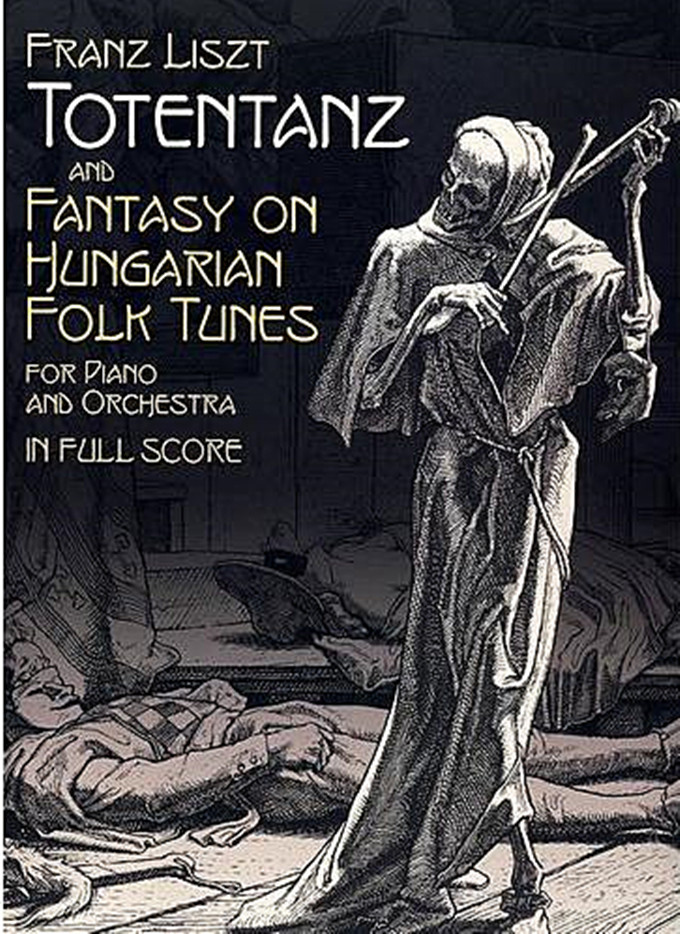 |
|
|
|
| |
李斯特《死之舞》 |
|
|
|
| |
此曲作于李斯特在意大利旅行期间,据说是他在比萨的寺院墓地“圣洁之野”看到奥卡纳的壁画《死的胜利》所得的灵感。在乐曲中李斯特运用了著名的《震怒之日》来点睛,收到相当好的效果。又将这恐怖荒诞的动机同中世纪的一首咏唱“末日审判”的教会歌曲《震怒之日》(即《安魂曲》格式中的第三乐章《末日经》的由来)联系起来,作成这首极富幻想色彩的杰作。
乐曲从钢琴弹出的强有力的“震怒”开始,此后的五组变奏,都是想象力无比丰富,音响上色彩绚丽而效果奇佳的。这支乐曲一开始就是古代罗马教皇格利高利“最后审判日”的圣歌曲调,沉重有力,象征着死神降临的脚步。此后,作曲家用这个曲调变奏出
26个迥异的音乐形象,有的轻快、活泼;有的庄严、稳重;有的辉煌、灿烂;有的幽默、有趣;有的优雅、小巧;有的粗鲁、笨拙……以此表达各种不同的人,他们无一例外都在走向死亡。 |
|
|
|
| |
It was
written during liszt's trip to Italy and is said to have been inspired
by the sight of Okana's mural "Victory of death" in the Holy Field, a
monastery cemetery in Pisa.In the music, Liszt used the famous "Day of
Wrath" to make the finishing point, which received quite good results.It
also links this horrible and absurd motive with the medieval church song
"The Day of Wrath" (the origin of the Third movement "The Doomsday Book"
in the form of "Requiem"), thus creating this masterpiece with high
fantasy color.
The music starts with a powerful piano rendition of "Rage", and then
five variations, all with rich imagination, brilliant colors and
wonderful effects.This piece of music begins as the tune of Pope Gregory
the Great's hymn to the Last Day of Judgment, a powerful symbol of the
coming of death.Later, the composer used this tune to play 26 different
musical images, some light and lively;Some were solemn and sober;Some
are brilliant and splendid;Some are humorous and funny;Some are elegant
and small;Some are rude, clumsy...To say that all kinds of people,
without exception, are going to die. |
|
|
|
| |
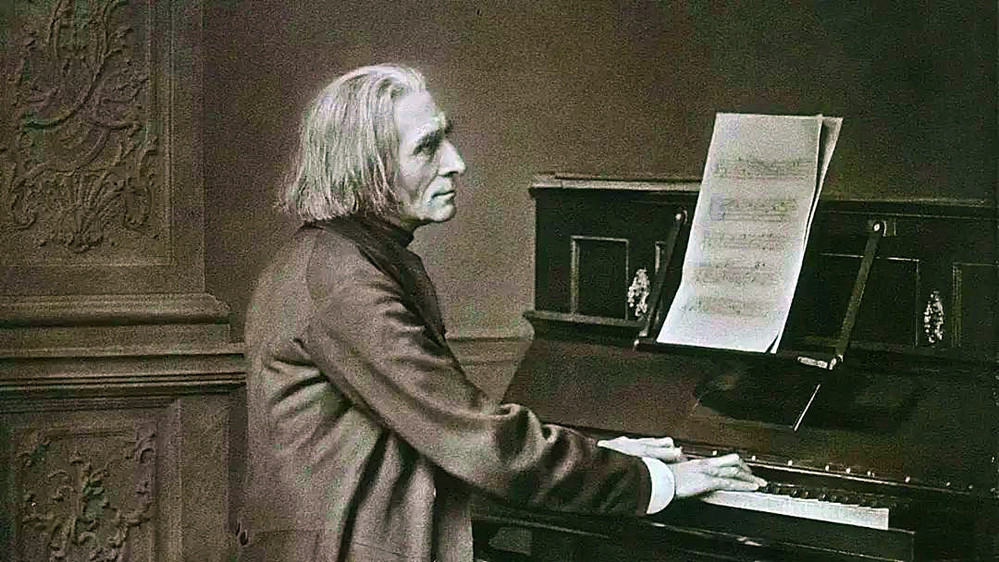 |
|
| |
弗朗茨·李斯特(Franz Liszt)在作曲中 |
|
|
|
| |
李斯特对于异性的磁力
|
|
|
|
| |
李斯特有不少的磁石性的轶话。他并不是一个十分热情的人。但他所接近的妇人,对于他都怀着一种难于抑制的恍惚的感情;
有一个有名的歌妓,她每逢要会见李斯特的时候,必定改穿男装,以弓I起
李斯特的注意。
有一位俄罗斯的伯爵夫人,曾经愤激于李斯特对她的无礼的态度,一次她竟持着手枪,闯进李斯特的卧室。这时候李斯特垂下双手,挺身而立,看着这位伯爵夫人,对她说:
“请打死我!”。
伯爵夫人听后弄得仝身战栗,把手枪丢在地板上,立刻逃出,回到自己的家中,伏在床上哭泣。
李斯特对妇人的交际情形都非常奇特,而且极不平凡。妇人们一见到李斯特,就好比受了他的魔法一般,神魂不定。曾经有一个妇人,她感到苦闷之极的时候,这样叹道:“倘若李斯特爱我1小时也好,就是舍弃生命我也在所不惜。”
长相英俊的李斯特曾引得名媛们极尽疯狂,撕碎其手绢作为珍藏,甚至惹得伯爵夫人为他抛家弃子。在他当上神父后仍风流不断,被人称为“披圣袍的梅菲斯特”一一这些,是世人在音乐之外最关注的趣闻韵事。 |
|
|
|
| |
Liszt's
magnetism to the opposite sex
Liszt has a lot of loadstone jokes.He is not a very warm
person.But all the women to whom he approached were possessed of
an irrepressible trance towards him;
There was a famous courtesan who, whenever she met Liszt,
changed to a man's dress and bowed her head
Liszt's attention.
A Russian countess, once angered by Liszt's rudeness, once broke
into his bedroom with a pistol.At that moment Lister dropped his
hands, stood up, looked at the countess, and said to her:
"Please shoot me!".
The countess trembled all over, dropped her pistol on the floor,
and immediately fled, returning to her own house, where she lay
sobbing on her bed.
Liszt's intercourse with women was peculiar and
extraordinary.The sight of Liszt made the women feel as if they
were under his spell.There was once a woman who, in the depths
of her anguish, sighed, "If Liszt would have loved me for an
hour, I would have laid down my life."
The
handsome Liszt had attracted the craziest of courtesans, tearing
up his handkerchiefs for collection and even causing the
Countess to abandon her family for him.After he became a priest,
he continued to have a romantic life and became known as
"Mephistophanes in the Holy Mantle". These are the anecdotes
that the world has been most interested in outside of music. |
|
|
|
| |
|
|
|
|
| |
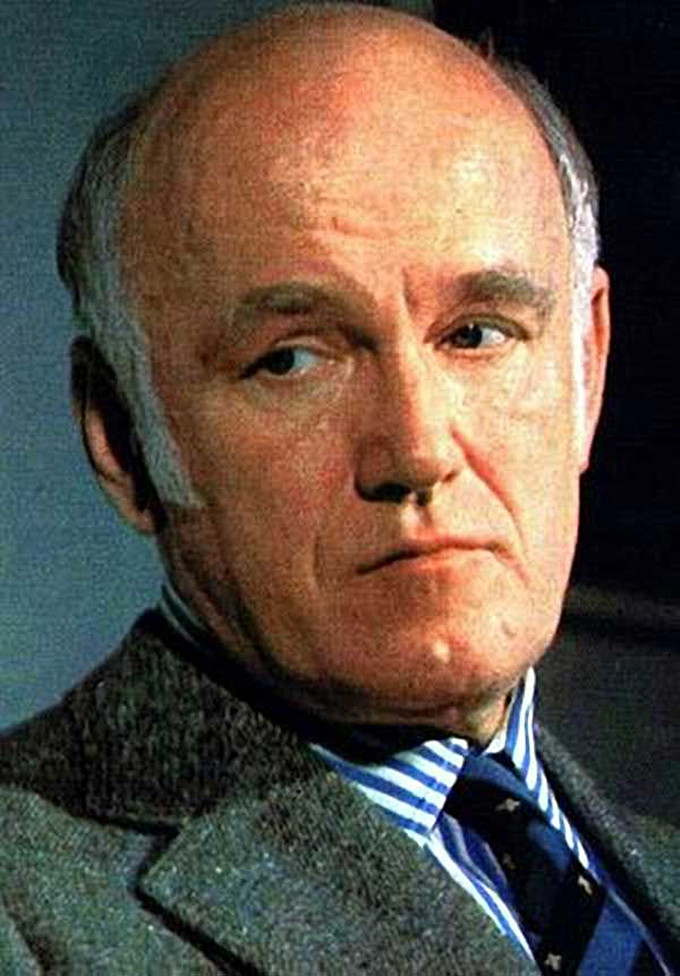 |
|
|
|
| |
斯维亚托斯拉夫·里赫特(Святослав Рихтер) |
|
|
|
| |
斯维亚托斯拉夫·里赫特(Святослав
Рихтер,1915年3月20日~1997年8月1日),出生于日托米尔,钢琴演奏家。
他以极广的演奏范围,举重若轻的技术以及富有诗意的分句闻名,他的演奏曲目如同百科百书一样广,不管是视谱或背谱演出,都能弹出杰出且深刻的音符,令人赞赏的演奏技巧,与对各个作品深邃且独特的了解。
里赫特演奏技术游刃有余,演奏起来得心应手,并有富于弹性和诗意的分句,以及清楚的内部和层次结构。他的演奏曲目很广,并是一个很内在的音乐家。在演奏19世纪浪漫派作曲家的作品,特别是舒柏特与舒曼的作品达到了完美的诗意境界;而他演奏的德彪西和拉威尔的作品,有给人以无比细致的感觉。同时他也是一个出色的室内乐钢琴家,曾在萨尔斯堡音乐节与布里顿和罗斯特罗波维奇联合演出。他录制的李斯特钢琴作品至今仍脍炙人口。
里赫特演奏技术游刃有余,演奏起来得心应手,并有富于弹性和诗意的分句,以及清楚的内部和层次结构。他的演奏曲目很广,并是一个很内在的音乐家。在演奏19世纪浪漫派作曲家的作品,特别是舒柏特与舒曼的作品达到了完美的诗意境界;而他演奏的德彪西和拉威尔的作品,有给人以无比细致的感觉。同时他也是一个出色的室内乐钢琴家,曾在萨尔斯堡音乐节与布里顿和罗斯特罗波维奇联合演出。他录制的李斯特钢琴作品至今仍脍炙人口。
擅长演奏巴赫,贝多芬,舒伯特,海顿,肖邦,李斯特,拉赫曼尼诺夫,普罗柯菲耶夫,肖斯塔科维奇等作曲家的曲目。
他喜于现场演奏,因此有着大量数不清的现场演奏记录,不论是正式或非正式,每年仍有大量的录音出土,可说是生前死后都引领风骚的一代大家。 |
|
|
|
| |
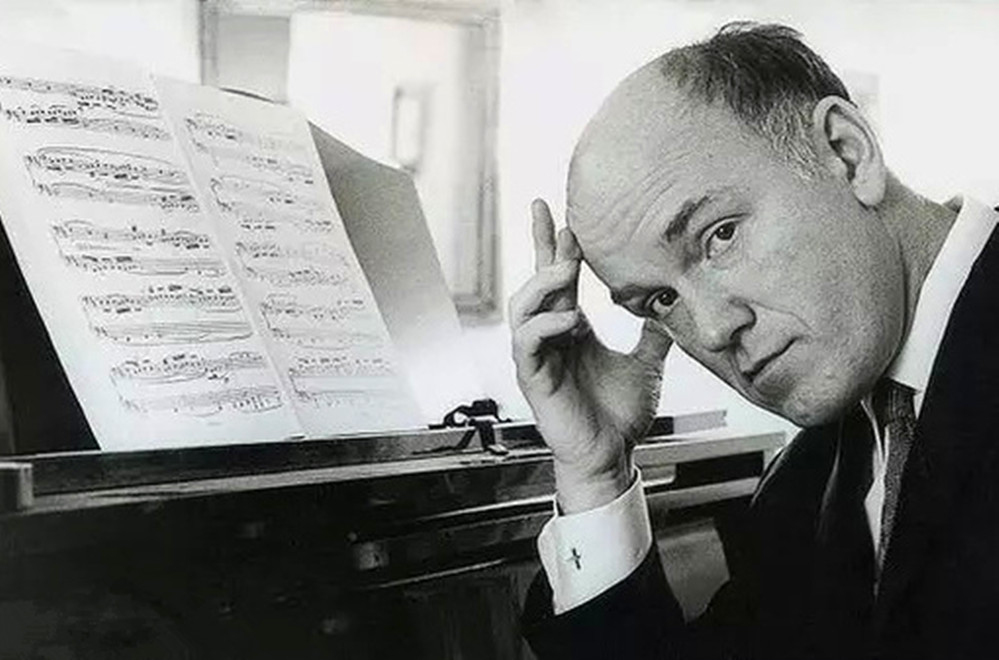 |
|
| |
斯维亚托斯拉夫·里赫特(Святослав Рихтер) |
|
|
|
| |
Святослав Рихтер(Святослав Рихтер, March 20, 1915 to August 1, 1997),
born in day care mir, pianist.
He is known for his wide range of performances, lightweight techniques
and poetic clauses. His repertoire is as broad as a hundred encyclopedic
books. Whether performed by visual notation or back-notation, he can
play outstanding and profound notes, his playing skills are admirable,
and he has a profound and unique understanding of each work.
Richter plays with skill and ease, with elastic and poetic phrasing and
a clear interior and hierarchy.He has a wide repertoire and is an inner
musician.In performing the works of romantic composers in the 19th
century, especially shubert and Schumann's works reached a perfect
poetic state;And the Debussy and Ravel pieces that he played, there was
an incredible sense of detail.He was also an outstanding chamber
pianist, performing at the Salzburg Festival with Britten and
Rostropovich.His recordings of Liszt piano are still very popular today.
Richter plays with skill and ease, with elastic and poetic phrasing and
a clear interior and hierarchy.He has a wide repertoire and is an inner
musician.In performing the works of romantic composers in the 19th
century, especially shubert and Schumann's works reached a perfect
poetic state;And the Debussy and Ravel pieces that he played, there was
an incredible sense of detail.He was also an outstanding chamber
pianist, performing at the Salzburg Festival with Britten and
Rostropovich.His recordings of Liszt piano are still very popular today.
He is good at playing pieces by Bach, Beethoven, Schubert, Haydn,
Chopin, Liszt, Rachmaninoff, Prokofiev, Shostakovich and other
composers.
He was fond of live performance, so there are numerous records of live
performance. Whether formal or informal, a large number of recordings
are still unearthed every year, which can be said to be the leading
generation in life and death. |
|
|
|
| |
|
|
|
|
| |
里赫特在电影《李斯特》中扮演的李斯特演奏格林卡 |
|
|
|
| |
演奏作品为《鲁斯兰和柳德米拉》中的Chernomor's March |
|
|
|
| |
|
|
|
|
| |
|
|
|
|
| |
未得原作者编者授权严禁转载www.mt77.com任何内容 |
|
|
|
|
|
|
|
|
|
|
|
|
|
|


